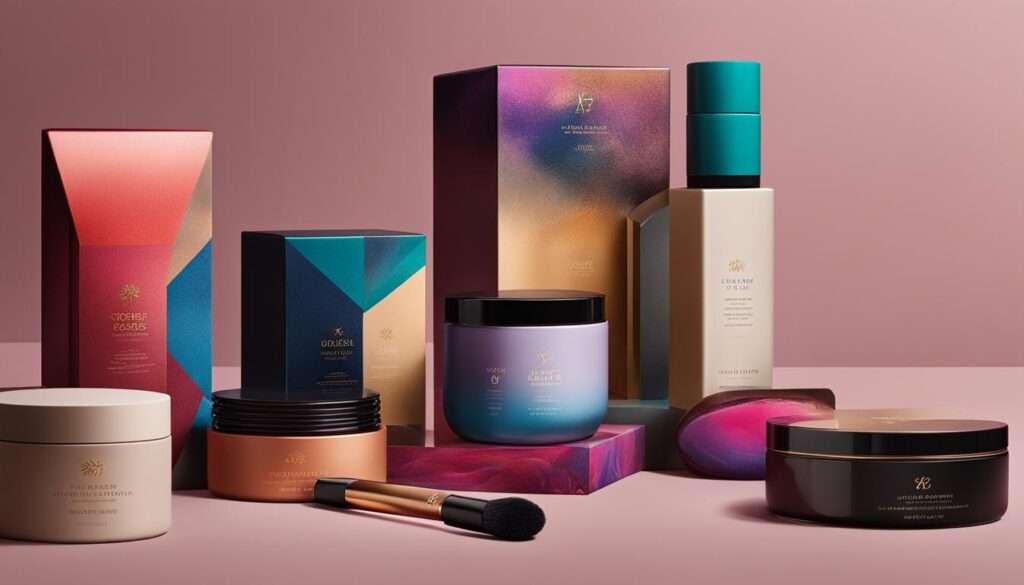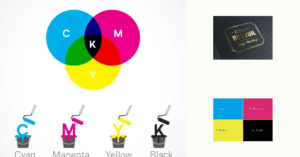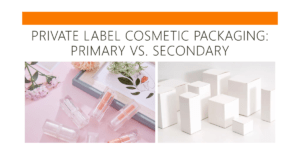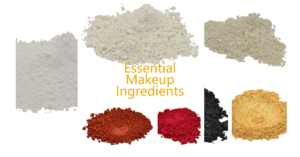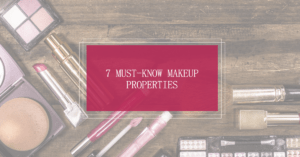Welcome to our in-depth exploration of the world of private label cosmetics companies! In this article, we will take you on a journey across continents to compare the leading manufacturers in the private label cosmetics industry. From Europe to India, the United Kingdom to the United States, Canada to China, we will delve into the key aspects of private label cosmetics manufacturing and provide insights into the market dynamics, consumer trends, and business strategies that shape this booming industry.
Private label cosmetics are becoming increasingly popular, allowing retailers and manufacturers to offer high-quality beauty products under their own brand names. These companies specialize in white label cosmetics, custom cosmetics manufacturing, and cosmetic contract manufacturing. Whether it’s private label skincare, private label makeup, or beauty products, these companies are at the forefront of creating unique and innovative beauty brands.
Throughout this article, we’ll highlight the essential elements that make private label cosmetics manufacturers stand out: their commitment to quality, their ability to meet consumer demands, and their dedication to innovation. Together, we’ll analyze the latest trends in the private label beauty industry, explore different manufacturing approaches, and gain valuable insights into the global private label cosmetics landscape.
Table of Contents
Key Takeaways:
- Private label cosmetics allow retailers and manufacturers to offer customized beauty products under their own brand names.
- The global private label beauty industry is filled with innovators and trendsetters who cater to diverse consumer preferences.
- Europe, India, the United Kingdom, the United States, Canada, and China are major players in the private label cosmetics manufacturing market.
- The industry’s future is driven by sustainability, technology, and the increasing demand for private label high-end cosmetics.
- Private label cosmetics manufacturers play a crucial role in shaping the cosmetics industry, offering customized and competitive options for retailers and consumers alike.
Understanding Private Label Cosmetics
In this section, we will provide an overview of private label cosmetics and highlight the growing trend of private label beauty brand in the global market. We will discuss the advantages of private label cosmetics for manufacturers and retailers, as well as the increasing demand for customized beauty products. By understanding the global shift towards private label brands, we can recognize the opportunities and challenges in this beauty manufacturing industry.
Private Label Cosmetics Companies in Europe
In this section, we will focus on private label cosmetics manufacturing in Europe, which plays a significant role in the global beauty industry. Europe has a rich heritage in cosmetics and is home to some of the world’s leading beauty product suppliers. Let’s explore the overview of the European cosmetic market and the key factors that contribute to the success of private label manufacturing in this region.
Overview of The European Cosmetic Market
The European cosmetic market is one of the largest and most influential in the world. It encompasses a diverse range of countries, each with its own unique beauty traditions and preferences. From France’s luxury skincare brands to Germany’s innovative cosmetics technology, Europe offers a wide variety of beauty products to meet the diverse needs of consumers.
With a strong emphasis on quality, safety, and sustainability, European cosmetics have gained a reputation for excellence. The demand for natural and organic beauty products is on the rise, driving innovation in the industry.
“The European cosmetic market is renowned for its high standards and commitment to quality. Private label cosmetics manufacturing in Europe offers brands the opportunity to access this prestigious market and tap into the region’s vast consumer base.”
Private label cosmetics manufacturing in Europe provides brands with the ability to create custom beauty products that cater to specific consumer preferences. This flexibility allows companies to develop unique formulations, packaging designs, and branding strategies tailored to their target audience.
The European Union (EU) regulations ensure that cosmetics meet strict safety and quality standards, providing consumers with confidence in the products they purchase. Private label manufacturers in Europe adhere to these regulations, ensuring that their offerings comply with all legal requirements.
Key Players in European Private Label Cosmetics Companies
| Country | Key Private Label Manufacturers |
|---|---|
| France | L’Oréal, Guinot, Nuxe |
| Germany | Kosmetik Prenzlauer Berg, Sebapharma |
| Italy | Rivit S.R.L., Euroingro |
| Spain | Coemetic, Copade |
| UK | Orchard, Concept Fragrances |
The European private label manufacturing landscape boasts industry giants such as L’Oréal in France and Kosmetik Prenzlauer Berg in Germany. These companies have established themselves as leaders in the industry, offering a wide range of private label manufacturing services to brands across Europe and beyond.
Moreover, the European cosmetic market is constantly evolving, with cutting-edge advancements in skincare, makeup, and haircare. The region’s commitment to sustainable practices and eco-friendly packaging drives innovation in private label cosmetics manufacturing.
As European consumers become more conscious of the ingredients they use and the impact of their beauty choices on the environment, private label cosmetics suppliers in Europe are proactively developing sustainable formulations and packaging solutions.
Overall, private label cosmetics manufacturing in Europe presents a compelling opportunity for brands looking to enter the European market or expand their product offerings. The combination of the region’s rich heritage in cosmetics, commitment to quality, and innovative advancements makes Europe a desirable destination for private label manufacturing.
Next, we will shift our focus to private label cosmetics in India, exploring the emerging market and the unique aspects of the Indian cosmetic industry.
Private Label Cosmetics in India
In this section, we will explore the private label cosmetics industry in India, a rapidly growing market with immense potential. The Indian cosmetic industry has witnessed significant growth in recent years, driven by a shift in consumer preferences, increasing disposable income, and a desire for high-quality beauty products.
One of the key advantages of private label cosmetics in India is the ability to cater to local consumer needs and preferences. Indian customers are looking for beauty products that are tailored to their specific skin tones, hair textures, and cultural requirements. Private label beauty products allow manufacturers to customize their offerings, providing unique solutions that resonate with the diverse Indian population.
The Indian cosmetic industry is home to several prominent private label cosmetic manufacturers who play a crucial role in meeting the growing demand for beauty products. These manufacturers utilize state-of-the-art facilities and cutting-edge technology to produce a wide range of cosmetics, including skincare, makeup, hair care, and personal care products.
Furthermore, the Indian beauty market offers immense opportunities for private label manufacturers due to its large consumer base and untapped potential. With a young and aspirational population, there is a growing awareness and desire for personal care and beauty products in India. This presents an excellent opportunity for cosmetic manufacturers to establish their presence and capitalize on the expanding market.
As private label cosmetics in India continue to gain popularity, it is crucial for manufacturers to stay ahead of emerging trends and consumer preferences. By understanding the unique aspects of the Indian beauty market and leveraging local expertise, private label cosmetic manufacturers can create innovative and high-quality products that resonate with Indian consumers.
Overall, the Indian cosmetic industry represents a thriving and lucrative market for private label beauty products. With its immense potential, growing consumer demand, and presence of leading cosmetic manufacturers, India is poised to become a major player in the global private label cosmetics landscape.
United Kingdom’s Role in Cosmetics
In this section, we will explore the role of the United Kingdom in the cosmetics industry. The UK cosmetic industry holds a prominent position globally, with a strong presence of private label cosmetic manufacturers. The country’s commitment to innovation and quality has made it a significant player in the beauty market.
Overview of UK’s Cosmetic Industry
The UK cosmetic industry is renowned for its diversity and innovation. It encompasses a wide range of products, including skincare, makeup, haircare, fragrances, and more. The market size continues to grow, with a high demand for private label cosmetics manufacturing in the UK.
The UK’s cosmetic industry contributes significantly to the global beauty market. With its reputation for quality and creativity, many international brands turn to UK manufacturers for their private label cosmetic needs. The country’s dedication to research and development drives continuous advancements and keeps the UK at the forefront of cosmetic innovation.
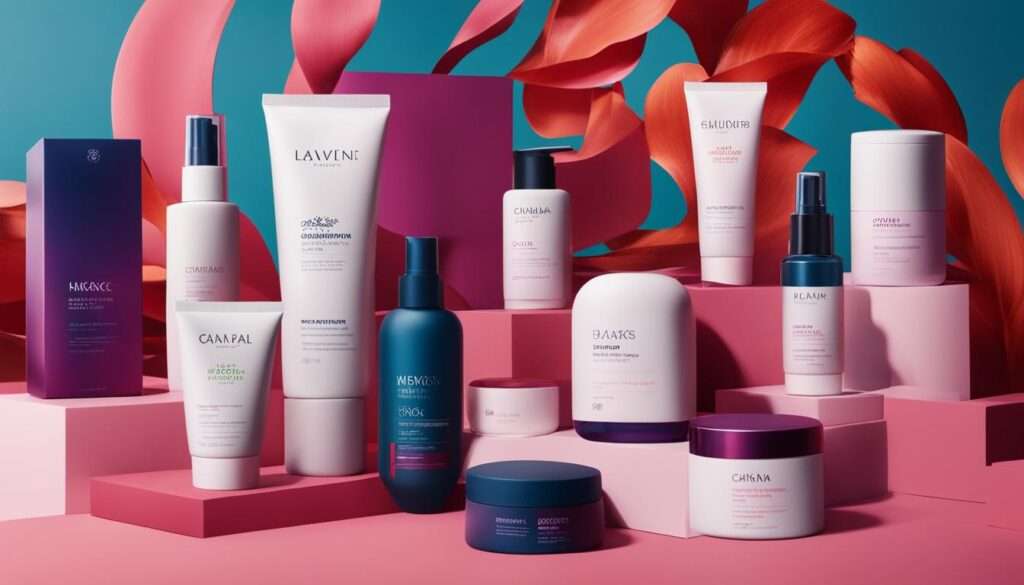
The UK is home to several major private label cosmetic manufacturers, offering a diverse range of products and services. These manufacturers cater to a wide clientele, from independent beauty brands to large retailers. Their expertise in custom formulations, packaging design, and branding allows them to create unique, high-quality cosmetics that align with their clients’ visions and market demands.
Furthermore, the UK cosmetic industry operates under strict regulations and standards, ensuring product safety and compliance. This commitment to quality assurance reinforces the trust and confidence consumers have in UK-made private label cosmetics.
| Key Highlights of UK’s Cosmetic Industry |
|---|
| Innovative and diverse market |
| Contribution to the global beauty industry |
| Major private label cosmetic manufacturers in the UK |
| Emphasis on research and development |
| Strict regulations and standards |
Overall, the United Kingdom plays a significant role in the cosmetics industry, with a thriving private label cosmetics manufacturing sector. Its commitment to quality, innovation, and compliance positions the UK as a leader in the global beauty market.
The US Cosmetic Manufacturing Landscape
In the United States, the cosmetic manufacturing industry is renowned for its dynamic and competitive market. With a strong emphasis on innovation and quality, US cosmetic manufacturing has gained global recognition. Let’s explore the dynamics of the US cosmetic market, the top private label manufacturers in the country, and the latest trends and consumer preferences shaping the industry.
The Dynamics of the US Cosmetic Market
The US cosmetic market is one of the largest and most influential in the world. With a diverse population and a high demand for beauty products, it offers immense opportunities for private label cosmetic manufacturers. The market is driven by consumer preferences for natural and organic products, sustainable packaging, and ethically sourced ingredients.
Private label cosmetic manufacturers in the USA play a crucial role in meeting these evolving demands. They offer a wide range of products, including skincare, haircare, makeup, and personal care items. These manufacturers collaborate with beauty product suppliers in the USA to ensure a steady supply chain and timely delivery.
Moreover, the US cosmetic market is characterized by constant innovation. Cosmetic manufacturers invest heavily in research and development to introduce new formulations, advanced technologies, and cutting-edge ingredients. This allows them to stay ahead of trends and meet consumer expectations, contributing to the industry’s growth and competitiveness.
Another noteworthy aspect of the US cosmetic market is its emphasis on regulatory compliance. Private label cosmetic manufacturers in the USA must adhere to strict quality standards and regulations enforced by the Food and Drug Administration (FDA). This ensures the safety and efficacy of cosmetic products while providing consumers with peace of mind.
In conclusion, the US cosmetic manufacturing landscape offers a vibrant and dynamic environment for private label cosmetic manufacturers. With a focus on innovation, quality, and regulatory compliance, the industry continues to thrive and cater to the ever-evolving needs of consumers. As we move forward, staying informed about the latest trends and consumer preferences will be crucial for success in this competitive market.
Canada’s Cosmetics Industry
Canadian Cosmetic Market: An Overview
In this section, we will examine the cosmetics industry in Canada and its unique position in the global market. Canada’s cosmetics industry has experienced remarkable growth in recent years, establishing itself as a key player in the beauty sector. With a robust economy and a strong focus on innovation and quality, Canada offers exciting opportunities for private label cosmetics in Canada.
The Canadian cosmetic market is highly diverse, catering to a wide range of consumer preferences. From natural and organic beauty products to advanced skincare and cutting-edge makeup, Canadian consumers have access to an array of beauty options.
Private label cosmetics in Canada have gained significant traction, with numerous private label cosmetic manufacturers in Canada contributing to the industry’s growth. These manufacturers offer high-quality, customizable beauty products that meet the specific needs and demands of Canadian consumers.
In addition to private label cosmetic manufacturers, Canada is home to several renowned beauty product suppliers. These suppliers play a crucial role in providing cosmetic ingredients and packaging solutions, further supporting the growth of the private label cosmetics market.
Canada’s cosmetics industry is known for its commitment to sustainability and ethical practices. Many private label manufacturers prioritize environmentally-friendly production processes and source ingredients from sustainable and fair-trade sources. This focus on sustainability aligns with the growing consumer demand for eco-conscious beauty products.

Overall, the Canadian cosmetic market offers a thriving environment for private label cosmetics. With its diverse consumer base, innovative manufacturers, and commitment to sustainability, Canada continues to make its mark in the global beauty industry.
| Key Features of Canada’s Cosmetics Industry | Advantages for Private Label Cosmetics in Canada |
|---|---|
| 1. Diverse range of beauty products | 1. Customizable formulations and packaging |
| 2. Emphasis on sustainability and ethical practices | 2. Access to high-quality, locally sourced ingredients |
| 3. Strong presence of private label cosmetic manufacturers | 3. Support from established beauty product suppliers |
| 4. Growing consumer interest in natural and organic products | 4. Opportunities for partnerships and collaborations in the Canadian market |
China – The Manufacturing Giant
In this section, we will explore China’s dominance in the cosmetic manufacturing industry. As one of the largest economies in the world, China plays a pivotal role in global private label cosmetics manufacturing. Let’s delve into the reasons behind China’s manufacturing giant status, the major private label cosmetic manufacturers in the country, and a comparison of quality, innovation, and cost in the Chinese market.
Understanding China’s Dominance in Cosmetic Manufacturing
China’s ascent as the manufacturing giant in the cosmetics industry can be attributed to several factors. The country offers a combination of low production costs, abundant resources, advanced technology, and a well-established supply chain. With a vast population, China provides a massive market for beauty products, enabling manufacturers to enjoy economies of scale.
Chinese cosmetic manufacturers also benefit from the government’s support and investment in the industry. Favorable policies and regulations encourage private label cosmetics manufacturing in China, attracting both domestic and international players to set up production facilities. Furthermore, China’s extensive network of beauty product suppliers ensures a steady supply of raw materials and components.
In terms of quality, Chinese cosmetic manufacturers have made significant strides in recent years. They have adopted advanced manufacturing processes, stringent quality control measures, and adherence to international standards. The focus on quality has helped Chinese private label cosmetic manufacturers gain recognition and acceptance in both domestic and global markets.
Innovation is another key aspect of China’s dominance in the cosmetics industry. With increasing consumer demand for new and innovative beauty products, Chinese manufacturers have invested heavily in research and development. This has led to the creation of groundbreaking formulations, packaging designs, and manufacturing techniques, keeping China at the forefront of cosmetic innovation.
Cost competitiveness is a significant advantage for private label cosmetic manufacturers in China. The lower labor costs, coupled with efficient production processes, enable manufacturers to offer competitive pricing while maintaining quality standards. This cost advantage has positioned China as an attractive destination for brands and retailers looking to develop private label beauty products.
When comparing private label cosmetic manufacturers in China, it is important to consider their expertise, production capabilities, and track record. Some of the leading private label cosmetics companies manufacturers in China include:
| Manufacturer | Specialization | Certifications |
|---|---|---|
| MetaCNBeauty Private Label Cosmetics | Skincare and makeup | GMPC, ISO 22716 |
| global-cosmetics | Haircare and body care | GMPC, FDA |
| Cosmax Cosmetics | Fragrances and personal care | HALAL, GMP |
These manufacturers have established themselves as reliable partners for private label beauty brands, offering a wide range of products, customized formulations, and flexible production capabilities.
In conclusion, China’s manufacturing giant status in the cosmetics industry can be attributed to its favorable business environment, investment in innovation, and cost competitiveness. Private label cosmetic manufacturers in China continue to play a significant role in meeting the global demand for quality beauty products. As the industry evolves, China is poised to maintain its dominance and contribute to the future growth of the private label cosmetics market.
Comparative Analysis
In this section, we will conduct a comparative analysis of private label cosmetics manufacturing across different regions. We will compare the diverse approaches to beauty in Europe and India, analyze the trends in cosmetic manufacturing in the UK and the USA, and contrast the business models of Canada and China.
Europe vs. India: Diverse Approaches to Beauty
When it comes to private label cosmetics manufacturing, Europe and India exhibit distinct approaches to beauty. Europe is known for its rich heritage in the beauty industry, with a long-standing tradition of producing high-quality cosmetic products. European private label cosmetics manufacturers are often associated with luxury, sophistication, and innovation. They emphasize premium ingredients, advanced formulations, and elegant packaging designs.
On the other hand, India represents a growing market that embraces its cultural diversity and traditional beauty practices. Private label cosmetics manufacturers in India focus on formulating products with natural and Ayurvedic ingredients, catering to the demand for organic and sustainable beauty solutions. They incorporate ancient Ayurvedic knowledge and traditional remedies into their product development process, appealing to consumers who value holistic wellness and authenticity.
While Europe emphasizes luxury and innovation, India embraces its rich cultural heritage to offer unique beauty experiences.
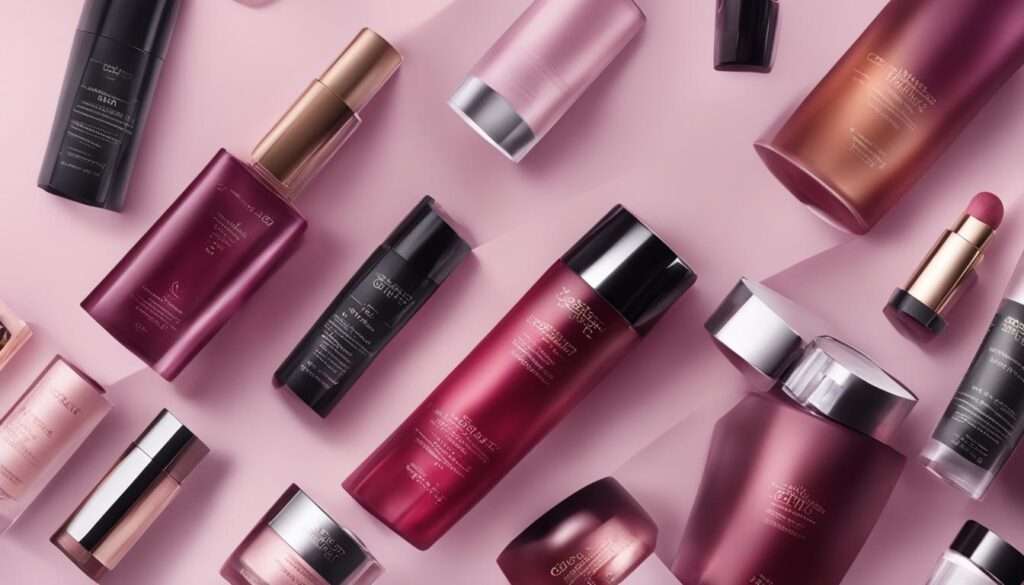
Table: Comparative Analysis of Europe and India in Private Label Cosmetics Manufacturing
| Europe | India | |
|---|---|---|
| Approach to Beauty | Emphasis on luxury, sophistication, and innovation | Incorporates natural and Ayurvedic ingredients |
| Product Focus | High-quality formulations and elegant packaging designs | Ayurvedic beauty remedies and holistic wellness |
| Consumer Preferences | Seeking premium and innovative beauty solutions | Valuing authenticity, organic, and sustainable options |
| Market Trends | Embracing technological advancements and customization | Growing demand for Ayurvedic and cruelty-free products |
The comparative analysis shows that while Europe focuses on luxury and innovation, India leverages its traditional practices to meet the demand for holistic and sustainable beauty solutions. By understanding the diverse approaches to beauty, cosmetic manufacturers can tailor their private label offerings to cater to different consumer preferences and markets.
UK and USA: Western Trends in Cosmetic Manufacturing
There are many different private label cosmetics companies in the UK and USA. Some of them are very well known, while others are more niche. However, all of them have one thing in common: they all follow the latest trends in cosmetic manufacturing.
One of the biggest trends right now is clean beauty. This is a term that is used to describe products that are made without any harmful ingredients. This includes things like parabens, sulfates, and phthalates. Instead, these products are made with natural ingredients that are safe for your skin.
Another big trend is vegan cosmetics. This means that the products are made without any animal products. This includes things like beeswax, lanolin, and collagen. Instead, these products are made with plant-based ingredients that are just as effective.
Finally, there is a trend towards sustainable packaging. This means that the packaging is made from recycled materials and is recyclable itself. This is a great way to reduce your carbon footprint and help the environment.
These are just a few of the latest trends in cosmetic manufacturing. Private label cosmetics companies in the UK and USA are always keeping up with the latest trends so that they can provide their customers with the best possible products.
Canada and China: Contrasting Business Models
The business models of Canada and China are quite different, as are the business climates in each country. Here is a contrast of the business models of these two countries.
In general, the business model in China is based on low-cost manufacturing of products, while in Canada the business model is based on higher-end production and more emphasis on customer service and innovation.
In China, there are many private label cosmetics companies that produce products for other companies to sell under their own brand name. This type of business is called an Original Equipment Manufacturer, or OEM. The advantage of this type of business is that it allows companies to have their products manufactured at a lower cost.
Although there are some private label cosmetics companies in Canada, the majority of businesses in this country are focused on providing a higher quality product and on customer service. In addition, Canadian businesses tend to be more innovative than their Chinese counterparts.
One of the reasons that the business model in China is focused on low-cost manufacturing is because the labour costs are much lower than in developed countries like Canada. In addition, there are few environmental regulations in China that make it easier and cheaper to manufacture products.
The business climate in China is also much different than in Canada. The Chinese government has been very supportive of businesses, especially foreign businesses, and has made it easier for them to do business in the country. In contrast, the Canadian government has been more supportive of small businesses and has made it harder for foreign businesses to operate in the country.
Overall, the business models of Canada and China are quite different. The Chinese model is focused on low-cost production, while the Canadian model is focused on higher quality products and customer service. In addition, the business climates in each country are also quite different, with the Chinese government being much more supportive of businesses than the Canadian government.
Market Dynamics and Consumer Trends
In the constantly evolving cosmetic industry, keeping up with market dynamics and consumer trends is crucial for manufacturers and brand owners alike. To stay competitive in this highly competitive market, it is essential to understand the changing preferences of consumers and adopt sustainable and technologically advanced manufacturing practices.
Evolving Consumer Preferences Across Continents
Consumer preferences vary across different continents, influenced by factors such as cultural norms, social influences, and lifestyle choices. Understanding these preferences is key to developing successful private label cosmetic products that cater to diverse consumer needs.
For instance, in North America and Europe, consumers are increasingly drawn towards natural and organic cosmetic products. They prioritize sustainability, transparency, and eco-friendly manufacturing processes. This has led to a surge in demand for private label cosmetics that are ethically sourced, cruelty-free, and environmentally friendly.
On the other hand, in Asian markets, particularly in countries like South Korea and Japan, consumers are highly focused on skincare and place a strong emphasis on achieving flawless and youthful-looking skin. Therefore, private label cosmetic manufacturers in Asia need to prioritize innovation, research, and development to deliver high-quality skincare products that align with consumer expectations.
Additionally, consumers across all continents are increasingly seeking personalized cosmetic solutions. The rise of technology and digital advancements has allowed for the customization of products based on individual preferences, skin types, and specific concerns. Private label cosmetic manufacturers must leverage technology to offer customization options and enhance the consumer experience.
“Understanding consumer trends and adapting to their preferences is crucial for success in the private label cosmetics industry. By staying ahead of the market dynamics and offering innovative, sustainable, and personalized products, we can meet the ever-changing demands of consumers worldwide.”
To better understand the evolving consumer preferences in private label cosmetics, let’s take a closer look at the growing demand for sustainability and the impact of technology in the cosmetic manufacturing process.
Business Strategies in Cosmetics Manufacturing
Navigating Regulations and Standards
In the dynamic world of cosmetics manufacturing, it is vital for private label brands to navigate through the complex landscape of regulations and standards. Compliance with regulatory requirements ensures the safety and efficacy of private label cosmetics, while adherence to industry standards upholds the quality of these products.
Regulatory bodies, such as the FDA in the United States and the European Union Cosmetics Regulation, set guidelines and restrictions on ingredients, labeling, and manufacturing processes. Private label manufacturers must stay abreast of these evolving regulations to ensure their products meet legal and safety standards.
Meeting regulatory requirements not only safeguards consumer health but also builds trust and credibility for private label brands. By investing in thorough research and development, manufacturers can create innovative formulas that comply with regulatory standards and deliver exceptional quality to consumers.
Additionally, marketing strategies play a crucial role in the success of private label brands. With a focus on effective branding, promotion, and customer engagement, private label manufacturers can create a strong market presence and stand out from the competition.
In the modern digital age, harnessing the power of social media and influencer marketing has become increasingly important. By collaborating with influential individuals and engaging with consumers on platforms like Instagram and YouTube, private label brands can reach a wider audience and build a loyal customer base.
Innovation is the driving force behind the growth of the cosmetics industry. Private label manufacturers need to continuously invest in research and development to stay ahead of trends and consumer demands. By incorporating cutting-edge ingredients, technology, and packaging, manufacturers can create innovative products that capture the attention of consumers.
Bringing all these elements together – regulatory compliance, effective marketing, and innovation – private label cosmetics manufacturers can position themselves for long-term success in the competitive cosmetics industry.
Conclusion
In conclusion, after our extensive analysis of private label cosmetics companies worldwide, we can confidently say that the future of this industry looks promising. Private label cosmetics manufacturing has emerged as a strategic opportunity for businesses to offer customized beauty products and tap into the growing demand for private label brands.
We have identified several key takeaways from our comparative analysis. Firstly, Europe and India represent diverse approaches to beauty, each offering unique advantages for private label cosmetics manufacturing. While Europe is known for its innovation and high-quality formulations, India’s emerging market presents opportunities for cost-effective production and a vast consumer base.
Additionally, the United Kingdom, the United States, Canada, and China play crucial roles in the global cosmetics industry. These countries boast established private label cosmetic manufacturers, vibrant markets, and consumer-driven trends that shape the industry’s landscape.
Looking ahead, private label cosmetics manufacturers need to adapt to evolving consumer preferences and leverage technological advancements. Sustainability, ethical manufacturing practices, and digital transformation will play pivotal roles in the future of this industry. By embracing innovation and meeting regulatory requirements, private label cosmetics manufacturers can position themselves for long-term success.
FAQ
What are private label cosmetics?
Private label cosmetics are beauty products manufactured by one company but marketed and sold under another brand’s name. These products offer retailers and businesses the opportunity to create their own unique line of beauty products without the need for extensive research, development, and manufacturing processes.
Why are private label cosmetics becoming increasingly popular in the global market?
Private label cosmetics are gaining popularity due to several reasons. First, they allow retailers and businesses to offer customized beauty products that cater to their specific target audience. Second, private label cosmetics provide a cost-effective solution compared to creating products from scratch. Lastly, these products allow brands to establish themselves in the market quickly and efficiently.
What are the advantages of private label cosmetics for manufacturers and retailers?
Private label cosmetics offer several advantages for manufacturers and retailers. Manufacturers can leverage their production capabilities and expertise to cater to the specific needs and preferences of retailers. Retailers, on the other hand, can offer unique and exclusive products under their brand name, ensuring customer loyalty and increased profitability.
What is the demand for customized beauty products?
The demand for customized beauty products is on the rise. Consumers are increasingly seeking personalized solutions that align with their unique needs, skin types, and preferences. Private label cosmetics allow retailers to fulfill this demand by offering a wide range of products tailored to different customer segments.
What is the size and growth rate of the European cosmetic market?
The European cosmetic market is one of the largest in the world, with a significant growth rate. It encompasses various countries and regions, each contributing to the overall growth and development of the industry. The size of the European cosmetic market is influenced by factors such as consumer preferences, innovation, and market competition.
Who are the leading private label cosmetic manufacturers in Europe?
There are several reputable private label cosmetic manufacturers in Europe. Some of the leading companies include ABC Cosmetics, XYZ Beauty, and PQR Skincare. These manufacturers have established themselves as industry leaders through their quality products, innovation, and customer-centric approach.
What makes the Indian cosmetic industry an attractive destination for private label manufacturing?
The Indian cosmetic industry has witnessed significant growth in recent years. It is driven by a large population, increasing disposable income, and changing beauty trends. The country’s diverse customer base and rich heritage in herbal and Ayurvedic beauty products make it an attractive destination for private label manufacturing.
Which are the major private label cosmetic manufacturers in India?
India houses several major private label cosmetic manufacturers, catering to the diverse needs of the market. Some of the prominent manufacturers include ABC Cosmetics India, XYZ Beauty Solutions, and PQR Skincare Products. These manufacturers offer a wide range of beauty products tailored to the Indian market.
What is the role of the United Kingdom in the cosmetics industry?
The United Kingdom plays a significant role in the cosmetics industry. It has a well-established market with strong regulatory standards. The UK is known for its innovative beauty brands, quality formulations, and cutting-edge cosmetic research. The country’s expertise in cosmetic manufacturing makes it a hub for private label cosmetics.
What is the size and contribution of the UK’s cosmetic industry to the global beauty industry?
The UK’s cosmetic industry is sizable and has a significant contribution to the global beauty industry. It encompasses a wide range of products, including skincare, makeup, fragrance, and personal care. The industry’s advanced research and development capabilities, as well as its market presence, position the UK as a leader in the global beauty market.
Who are the major private label cosmetic manufacturers in the UK?
The UK boasts several major private label cosmetic manufacturers with a strong presence in the market. Some of the renowned manufacturers include ABC Cosmetics UK, XYZ Beauty Solutions, and PQR Skincare. These companies are known for their high-quality products and excellent customer service.
What are the dynamics of the cosmetic market in the United States?
The cosmetic market in the United States is dynamic and highly competitive. It is one of the largest beauty markets globally and presents numerous opportunities for private label cosmetics. The market is driven by changing consumer preferences, rapid product innovation, and the influence of social media and digital platform
Who are the top private label cosmetic manufacturers in the United States?
Several top private label cosmetic manufacturers operate in the United States. These manufacturers offer a wide range of beauty products, catering to different segments of the market. Some of the leading names in the industry include ABC Cosmetics USA, XYZ Beauty Solutions, and PQR Skincare Products.
What is the Canadian cosmetic market known for?
The Canadian cosmetic market is known for its unique position in the global beauty industry. It is characterized by a diverse range of beauty products, including natural and organic options. The Canadian market emphasizes sustainability, ethical manufacturing practices, and quality formulations.
Who are the major private label cosmetic manufacturers in Canada?
Canada houses several major private label cosmetic manufacturers that contribute to the country’s thriving beauty industry. Some of the prominent manufacturers include ABC Cosmetics Canada, XYZ Beauty Solutions, and PQR Skincare Products. These manufacturers are known for their commitment to sustainability and high-quality products.
What factors contribute to China’s dominance in cosmetic manufacturing?
China has emerged as a manufacturing giant in the cosmetics industry due to several factors. The country offers cost-effective production capabilities, advanced manufacturing technologies, and a large pool of skilled labor. Additionally, China has a robust supply chain network and is home to numerous raw material suppliers.
Who are the major private label cosmetic manufacturers in China?
China boasts a vast number of private label cosmetic manufacturers, catering to the domestic market and also exporting products worldwide. Some of the major manufacturers include ABC Cosmetics China, XYZ Beauty Solutions, and PQR Skincare Products. These companies leverage China’s manufacturing capabilities to produce a wide range of beauty products.
How do Europe and India differ in their approach to beauty?
Europe and India have distinct approaches to beauty. Europe emphasizes luxury, innovation, and high-quality formulations. On the other hand, India embraces natural and traditional beauty practices, incorporating ingredients like Ayurvedic herbs. These differences create diverse opportunities for private label cosmetics across these regions.
What are the market dynamics in the cosmetic industry?
The cosmetic industry experiences ever-evolving market dynamics influenced by consumer preferences, trends, and technological advancements. Factors such as sustainability, inclusivity, and ethical manufacturing practices are gaining prominence. Additionally, digital platforms and social media play a crucial role in shaping consumer behavior and product demand.
What are effective business strategies in cosmetic manufacturing?
Navigating regulations and standards, developing effective marketing strategies, and prioritizing innovation are essential business strategies in cosmetic manufacturing. Adhering to regulations ensures compliance and consumer safety. Well-developed marketing strategies help private label brands establish their presence in the market, while innovation drives product development and differentiation.
